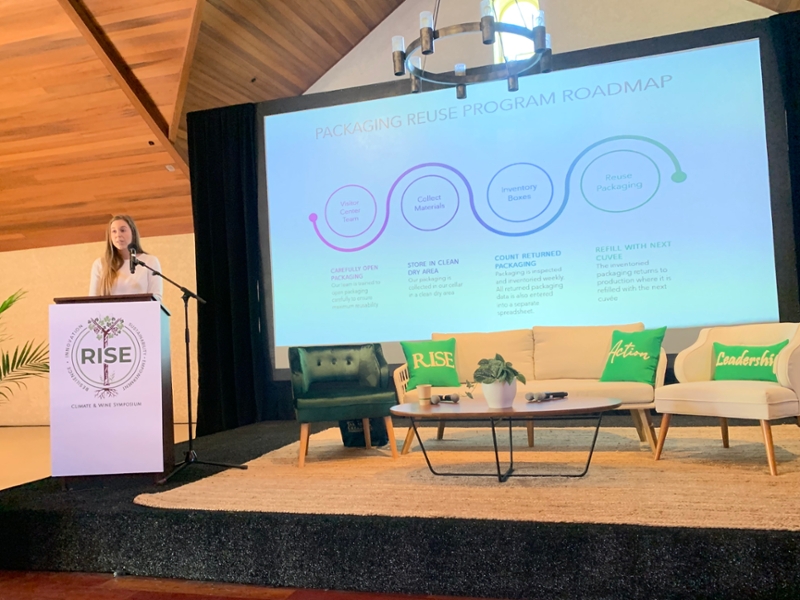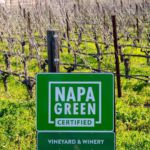
Conscious Container founder Caren McNamara discusses reusing bottles during an April 12 Napa RISE Wine & Climate Symposium workshop.
Photo Katherine Martine

Domaine Carneros enologist and sustainability lead Riley Sanchez explains the company's packaging reuse program.
Photo Katherine Martine
Napa RISE Wine & Climate Symposium Highlights Waste Reduction Efforts Wineries Can Take, Awards RISE Leadership Award to Domaine Carneros
- Katherine Martine | wine business I
- April 12, 2023
While bolstering waste prevention efforts and adopting sustainability actions may seem daunting, Jason Haas, partner and general manager at Tablas Creek Winery, asserts that you don’t have to do it all, but you need to do something—such as moving to lightweight glass or nixing the use of herbicides—and with the growing emergence of the use of kegs, lightweight glass, and the news that Conscious Container is working with a glass manufacturer to design an industry-standard refillable glass bottle, it’s becoming more accessible and getting a bit easier for the industry to do that “one thing.”
Haas’ message and the Conscious Container announcement were part of the “Waste Prevention and Supply Chain” session of the six-part Napa RISE Wine & Climate Symposium April 5-20 in St. Helena.
Attendees gathered at the Charles Krug Winery carriage house on April 12 for the half-day event, which also included the presentation of the RISE Leadership Award to Domaine Carneros for outstanding waste prevention and greening of its supply chain and a living room salon on leveraging culture, data and behavioral science for positive change with Cultique, Clif Family Winery & Farm, and Brooks Winery.
Ways to Cut Down on Waste
While Tablas Creek was the first vineyard operation in the world to achieve Regenerative Organic Certification (ROC) with ROC Gold status—gold representing the highest achievable level in regenerative organic production— in his marquee address, Haas emphasized that wineries shouldn’t “let the perfect be the enemy of good.”
“I think sometimes people look at certification programs and think, ‘I can’t do all of that,’ and I think one of the most important lessons that I convey is that you don’t need to do all of that but you need to do something,” Haas said.
He said you can do good by reducing water usage, reducing tillage, or by implementing solar, though he noted that solar should be a part of everyone’s solution.
“If you are putting in solar panels, that is going to basically take roughly 10% off of your carbon footprint,” Haas said.
In terms of other energy saving solutions, Haas pointed to night cooling-systems, motion sensor lights, and using better insulation. Regarding saving water, he suggested moving to steam for cleaning, reusing wastewater for irrigation, and capturing rain from roofs via a rain catchment system.
Making the switch to lightweight glass was another big topic, and a waste reduction method that Haas advocated (an article in the upcoming May issue of Wine Business Monthly will cover the beneficial domino effects for wineries of switching to lighter bottles).
In 2010, Paso Robles-based Tablas Creek moved to lightweight bottles. The winery worked with Tricor Braun and Ardagh Glass to create a domestic, lightweight mold with the winery’s leaf symbol and with this move, it reduced its case weight by 26% and reduced its packaging CO2 footprint by 12% versus its regular bottle and by 32% versus its heavy bottle.
With this change, Tablas also saw overwhelming positive customer feedback and an estimated $160,000 savings per year on glass and shipping costs. In the 14 years since the winery has made this switch it’s saved an estimated $2.2 million.
Lighter bottles aren’t the only environmentally-friendly bottle solution.
Conscious Container, a growing startup founded by Caren McNamara, washes and sells glass bottles in an effort to reduce carbon emissions and mitigate supply chain issues, and now, it’s working on designing an industry-standard refillable bottle.
“One of the most exciting pieces is—I have been working on this for six years—we have a glass manufacturer that is going to design industry standard refillable glass bottles and that is a huge milestone for the wine industry so that we can really begin to move into a collective industry standard bottle,” McNamara said.
Whether they’d offer the program just in the Napa/Sonoma region or elsewhere, and how they’d want to bring it to market are elements of the new program that still need to be worked out, but she said the goal is that the bottle wouldn’t cost any more than a single-use bottle. Plus, it would have branding on it that would identify it as a reused bottle.
McNamara, who led a morning workshop on refillable bottles and the 2024 CRV requirement, said they’re also working on refillable tasting room programs in which the bottles used to pour wine during tastings are sent to Conscious Container, washed and sent back to the winery for reuse. Though with this program, the bottles need to have wash off labels.
She pointed out that since wine brands will eventually have to redesign its labels to reflect CRV—while many aluminum, glass and plastic containers are subject to a refundable bottle recycling fee, wine and spirit containers are not, however, effective Jan. 1, 2024, they too will be subject to the fee— it may be a good time to look into transitioning to a wash off label.
Haas says kegs are also reusable and efficient. Since 2010, for wholesale, Tablas has kegged an average of 4,000 gallons of wine per year via Free Flow kegs and this year, it’s starting to fill 350 kegs per year in-house for its tasting room. With utilizing kegs, the winery is reducing bottle needs by 30,000 bottles/year and reducing its carbon footprint by 76% versus bottles. It’s also reducing wasted tasting room wine by 25%.
Representatives from Free Flow Wines were on hand earlier that morning to discuss the opportunities in kegging wine during an 8 a.m. workshop. Barclay Webster, vice president of business development and trade for Free Flow Wines, said one of the core benefits of using kegs for operators is profitability, largely from the restaurants who he said don’t have to pour wine down the drain that’s been open too long; with kegs, it’s fresh from the gecko. He added that with kegs, from a tasting room perspective, you don’t have to check that the wine is corked.
Boxes also seem like a promising tool for waste reduction. Last year Tablas released three wines in 3L boxes and the carbon footprint savings was 84% versus glass, plus, consumers loved it; the first release of 324 boxes of Patelin Rose sold out in just four hours.
Lastly, shipping via satellite hubs can also be a good way to reduce emissions.
Since March 2016, Tablas has shipped its club shipments from hubs that truck the wine to its destination. From this, the winery has seen monetary savings of $15 to $35 per shipment and a carbon savings of 85% versus air on those shipments, according to Haas.
Highlighting Other Wineries Who are Leaning into Sustainability
Domaine Carneros has a packaging reuse program that starts with its visitor center team, which is trained to carefully open the packaging to ensure maximum reusability. The materials are then stored in a dry area and the packaging is inspected and inventoried weekly—all returned packaging data is also entered into a separate spreadsheet.
The packaging is then reused and refiled with the next Cuvee.
Domaine Carneros’ enologist and sustainability lead Riley Sanchez, who accepted the RISE award, explained that one of the benefits of this program is that it acts as a buffer to supply chain disruptions, plus the brand saw a 63% increase in savings in the 2022 calendar year. With this program, it’s also diverted 32,000 pounds of cardboard.
Clif Family Winery & Farm in St. Helena has leaned into sustainability starting with organic food and farming, zero waste practices and with conserving and restoring natural resources, just to name a few. Linzi Gay, president of Clif Family Winery & Farm, also announced that it was recently awarded the B Corp certification; it will officially announce the certification in the coming weeks. Brooks Winery in Oregon is also B Corp certified and is a Demeter Certified biodynamic vineyard and winery, donates 1% of its annual revenues to support the environmental group Kiss the Ground, and is partnered with Ecologi to plant trees with every order, club anniversary and during special moments throughout the year.
ABOUT THE AUTHOR
Katherine Martine is the assistant editor for Wine Business Monthly. She joined the company in 2023 and is responsible for assisting the managing editor with production duties for the monthly trade magazine and the website. Katherine has five years’ experience working for various weekly news publications in Sonoma and Marin County covering city government, education, natural disasters, local business, public safety, and agriculture and wine. Most recently she worked as a beat reporter with The Ark newspaper in Tiburon. She earned her Bachelor of Arts in journalism from San Francisco State University. In her spare time, she enjoys hiking Petaluma trails and reading.
Making the commitment to third party certification takes time and effort, but it is worth it to demonstrate our commitment to the community and to protect our watershed, our land and the air we breathe.
- Susan Boswell, Chateau Boswell Winery


